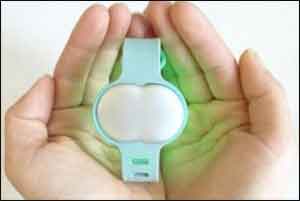- Home
- Editorial
- News
- Practice Guidelines
- Anesthesiology Guidelines
- Cancer Guidelines
- Cardiac Sciences Guidelines
- Critical Care Guidelines
- Dentistry Guidelines
- Dermatology Guidelines
- Diabetes and Endo Guidelines
- Diagnostics Guidelines
- ENT Guidelines
- Featured Practice Guidelines
- Gastroenterology Guidelines
- Geriatrics Guidelines
- Medicine Guidelines
- Nephrology Guidelines
- Neurosciences Guidelines
- Obs and Gynae Guidelines
- Ophthalmology Guidelines
- Orthopaedics Guidelines
- Paediatrics Guidelines
- Psychiatry Guidelines
- Pulmonology Guidelines
- Radiology Guidelines
- Surgery Guidelines
- Urology Guidelines
Smart device to detect pregnancy

Scientists have developed a smart bracelet that can not only identify the best time of the month for a woman to try for a baby but also alert when the user gets pregnant - an advance that could make traditional home pregnancy test obsolete.
Researchers conducted trials in Switzerland to identify minute physiological changes that take place when pregnancy starts.
Using an algorithm which learns the user's personal characteristics, the band can not only detect pregnancy but also identify the best time of the month when a woman can try for a baby.
The technology promises to allow women to do away with the morning ritual of a home pregnancy test, which assesses levels of human Chorionic Gonadotropin (hCG) in urine.
"Rather than waking up every morning and trying to pee on a stick to detect the rise in hCG you would simply have the bracelet worn both night and day," said Mohaned Shilaih, senior researcher at University Hospital Zurich.
The team behind the Ava bracelet plan to begin real-world tests of the system before the end of the year.
Researchers found a pulse variation of just 2.1 beats per minutes, as well as a 0.2 degree Celsius change in skin temperature, was indicative of the onset of pregnancy, probably due to hormonal changes involving progesterone and estrogen.
The smart bracelet is able to detect pregnancy around a week after conception, the same as the most sensitive pregnancy test, 'The Telegraph' reported.
The system would be continuously developed to monitor women during pregnancy, potentially providing early warning of serious conditions such as preeclampsia, which can force doctors to induce premature birth.
The algorithm is already being used in an existing Ava device to indicate when best to try for a baby.
So far they have recruited more than 300 women and have measured more than 1,000 menstrual cycles and 100 pregnancies.

Disclaimer: This site is primarily intended for healthcare professionals. Any content/information on this website does not replace the advice of medical and/or health professionals and should not be construed as medical/diagnostic advice/endorsement or prescription. Use of this site is subject to our terms of use, privacy policy, advertisement policy. © 2020 Minerva Medical Treatment Pvt Ltd